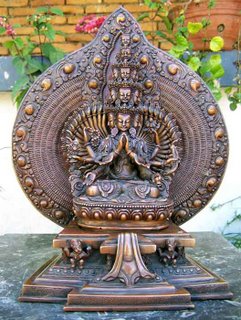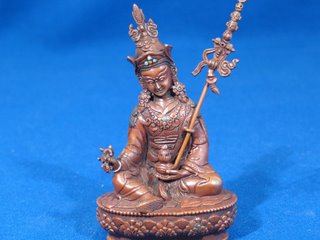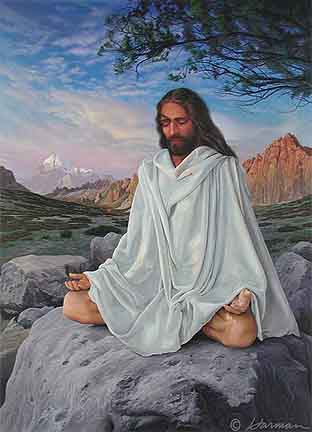Warning: This post meanders. If you like uninterrupted narrative, then this may not be the post for you. I've been reading the
Lotus Flower Sutra of the Wonderful Law, which, I believe, might also be translated as the
Lotus Flower Sutra of the Wonderful Dharma recently. I've been trying to read some of it just before going to bed. The reason for this is that I used to watch TV right before falling asleep. I recently heard a study that found that kids who watch TV right before sleeping have various issues, which, to tell the truth, I don't actually remember. However, I've noticed during my morning meditation that my mind often wanders to the plot of the TV episode I'd seen the previous night. What may in fact be the case is that the damn TV is percolating through my head throughout the gulldurn night. (Spellcheck just informed me that gulldurn is not a word.) Why should I let it? My goal is more spirituality, so it seems like a good idea to give my mind something spiritual to chew on as I sleep. You know, it's funny, as I'm writing this, more and more things are coming to mind. For instance, I have solved several math problems, or at least made a lot of conceptual progress on them, by falling asleep right after thinking hard about a problem. Evidently, my mind has kept working at it after I lose consciousness. So, again, it seems tremendously important to feed it something good. The other line of evidence I know is that I've heard several people in the fellowship of alcoholics anonymous mention that in their morning meditation, or prayer, or what have you, they are continuing where they left off the previous night. So, with all that said, I've been reading this sutra.
This sutra is the longest Buddhist sutra I've ever encountered. The Heart Sutra is a couple of pages long. The Diamond Cutter Sutra is 32 chapters of a couple of paragraphs each. The Sutra of Innumerable Meanings, and the Meditation Sutra on the Bodhisattva Universal Virtue are each a few pages long. Yet the Lotus Flower Sutra of the Wonderful Law is, if memory serves, more than 150 pages long. It's interesting because it alternates prose and poetry, with the poetry paraphrasing and amplifying the preceding prose. One of the key points this sutra makes is that the Buddha teaches through expedient means. In other words, he says what is needed to lead a particular person or class of person closer to enlightenment, even if what he says is not literally true. For example, many people are turned off by the promise of future Buddha-hood, and so when the Buddha started out, he didn't mention this. Only when his disciples had progressed enough did he reveal their destiny. There are several cool parables that explains this idea. One is called the parable of the Magic City, and it goes like this. Suppose you are leading a group of people across a desert, away from a place of great pain and suffering, and toward a place of happiness. Part way through the journey, the travelers start to complain about the arduousness of the journey and their current travails, and decide to turn back. Seeing this, in order to keep them moving in the right direction, you produce a magic city for them to inhabit, and once their urge to turn back has been quelled, you make the city disappear, and continue to lead them toward the real city on the other side of the desert. Even though you have produced an illusory city, you didn't really lie to them. It was just a way to keep them moving in the right direction.
I think Jesus may have been a Buddha. If I recall correctly, when people would ask him if he were the Messiah, if he were the Son of God, he started out by denying it. Only later in his ministry did he actually admit to it. Perhaps what is left unsaid here is that we are all children of God, as anonymous pointed out earlier. Sure Jesus is the Son of God, as are we all. This is a different language than the language of Buddhism, but Jesus needed to teach through expedient means. As a Jew preaching to Jews, he needed to speak their language. In the same way, much of Buddha's teachings are influenced by Hinduism. You need to give people a place to start. I think of Jesus as my root guru, and I don't think there's anything wrong with that.
In the Lotus Flower Sutra, the Buddha says that as soon as he became enlightened under the Bodhi tree, he always was the Tathagata. (This reminds me of an image I had when I was a child. I imagined that the universe began at some point, whereupon it started growing forwards and backwards in time. I liked to encapsulate this by the phrase "As soon as the Universe was created, it always was.") So, in some ways, the Tathagata has Godlike attributes. (You know, the word "Godlike" has lots of negative connotations. When people talk about being like Gods, it is often implied that they relish the feeling of power and superiority. Yet enjoying having another's fate in your hands is distinctly un-Godlike. God is not superior. He is not way up there with all of us way down here. We are all part of the God-consciousness. We are all part of the Tathagata. But ... we are not all awake, and so we are not all Buddhas.) I'm going to a Buddhist retreat this weekend, and I hope I can ask one of the monks there about this conception of the Tathagata. In any event, what I wanted to say was that in the same way that Shakyamuni Buddha is a specific instantiation of the Tathagata, so too is Jesus a specific awakened son of God.







